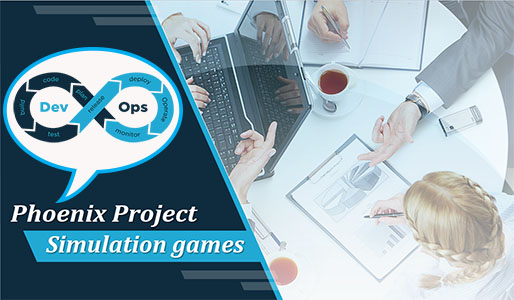What is the Phoenix Project?
Did you ever want to experience an IT transformation first hand?
The Phoenix Project is a book collaboratively written by Gene Kim, Kevin Behr, and George Spafford, to take you through the narrative journey of IT Manager, Bill Palmer, as he streamlines development and operations to deliver a business-critical, but failing project within a 90-day deadline using DevOps.
What is Dev Ops?
DevOps is a set of practices established to integrate IT development and operations, automate and streamline processes, and ultimately shorten the time required to deliver IT projects and updates. The challenge with DevOps is the mindset of the people involved. The process of getting IT Development and Operations onboard for drastic change is a potential land mine. A successful training program can make all the difference here.
The Phoenix Project Simulation is a hands-on DevOps Experience
This simulation game is based on The Phoenix Project. It is an excellent starting point for all organizations looking to explore DevOps principles. In the Simulation, teams are challenged with saving an organization and making it competitive and profitable using an IT-enabled business transformation project using DevOps principles.
Topics for this course
In this simulation program, participants are grouped into teams and challenged with saving the organization, Parts Unlimited. The only way to save this organization and make it profitable is The Phoenix Project, an IT-enabled business transformation project, with Retail Operations as the business owner.
The game is conducted in four rounds:
- Round 1 – This is a practice round, where participants receive some projects, features, and issues to familiarize themselves with the context of the simulation.
- Round 2 – In this round, the participants are split into two teams, IT Support and IT Development. Both teams have to struggle under pressure and time constraints to deliver their objectives and cope with increasing business demands, while simultaneously increasing cooperation with the other team. Throughout this round, participants discover how to apply the DevOps First-Way principle and supporting techniques. The round ends with a reflection session, exploring the DevOps theory, principles, and techniques that can be used to improve teamwork and achieve results. The team is requested to implement the learning outcomes in the next round.
- Round 3 – In this round participant are placed in a more challenging scenario, involving compliance and financial issues. The team discovers how to apply the DevOps Second Way principle and supporting techniques. The learning outcomes include understanding and responding to all customers, internal and external, shortening and amplifying all feedback loops, and embedding knowledge where it’s needed.
- Round 4 – This is the last and most important round. In this round, both teams learn how to optimize prioritization and decision making. The teams learn to apply the DevOps Third-way principle and supporting techniques. Participants learn how to create a culture that fosters continual experimentation, an appetite for risk, and the understanding that practice is the prerequisite to mastery.

